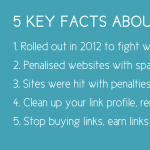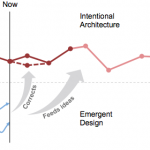How Does Google’s Panda Technology Work With Websites?
In the simplest terms, we can say that Panda is a learning algorithm that is used to sift through large volumes of statistical data to act like a logical centrifuge, separating “high quality sites” from “low quality sites”. The algorithm knows the difference because it is handed a learning set that has already been divided into “high quality” and “low quality” categories.You could take such an algorithm and give it a different learning set (say, “keyword-stuffed sites” and “natural language sites”) and maybe a different set of statistical data and it might be able to achieve a similar categorization.
Panda: Google in the battle against bad content
With the latest Google Panda update goes on the hunt for sites with poor quality in the content and rewarded in the same course websites with high quality content. It is particularly important that not only pure spam pages are punished on the Internet through Google, but it may already lead to a punishment, should not be part of the content. It also reflects on the quality standards of the new Google Panda update.
What’s bad content?
- Google gives the following on this subject out negative list (items that can not be met):
- Content without any real depth of information or too little information in general
- Ugly written content (keyword to frequent repetition, hollow rhetoric, etc.)
- Content, which was stolen from other site sources (and was not adequately referenced with sources)
- Useless content that the user provides no added value
It pays off so well, to design the site, especially FOR the user, so that it finds particularly useful information and they are also easy to use for the user (well-written).
What Google wants to achieve with this update?
As always, Google wants to improve search results, increase the relevancy of their results and thus increase hand in hand walking the user experience. A stated goal of Google Panda is to uncover content farms and lower its ranking on the Search Engine Result Page. Consequently, should the ranking of high-quality sites to be increased. So if you run a technically correct programmed website with honest, non-duplicate content, you have nothing to fear.
What impact has Google Panda on the search results?
In the U.S., after the use of the Pandas 12% of all search queries were affected by the change in ranking. The result for the affected low content websites were traffic losses of up to 90%. All in all, this update is to ensure that existing spam sites are displaced from the forward positions.
Who will benefit?
All website owners that offer relevant content have nothing to fear. On the contrary, by clearing out content farms your ‘honest site’ may actually result in better placement on the Google SERP.
Here are the Google Panda release dates:
Google Panda Update 1, Feb. 24, 2011 (Impact 11.8% )
Google Panda Update 2, April 11, 2011 (Impact 2% )
Google Panda Update 3, May 10, 2011 (no Impact)
Google Panda Update 4, June 16, 2011 (no Impact)
Google Panda Update 5, July 23, 2011 (no Impact)
Google Panda Update 6, Aug. 12, 2011 (Impact 6-9% )
Google Panda Update 7, Sept. 28, 2011 (no Impact)
Google Panda Update 8, Oct. 19, 2011 ( Impact 2% )
Google Panda Update 9, Nov. 18, 2011: (Impact less than 1% )
Google Panda Update 10, Jan. 18, 2012 (no Impact)
Google Panda Update 11, Feb. 27, 2012 (no Impact)
Google Panda Update 12, March 23, 2012 (Impact 1.6% )
Google Panda Update 13, April 19, 2012 (no Impact)
Google Panda Update 14, April 27, 2012: (no Impact)
Google Panda Update 15, June 9, 2012: (Impact 1% )
Google Panda Update 16, June 25, 2012: (Impact 1% )
Google Panda Update 17, July 24, 2012:(Impact 1% )
Google Panda Update 18, Aug. 20, 2012: (Impact 1% )
Google Panda Update 19, Sept. 18, 2012: (Impact less than 0.7% )
Google Panda Update 20 , Sep. 27, 2012 (Impact 2.4% )
Google Panda Update 21, Nov. 5, 2012 (Impact 1.1% of English-language queries in US; 0.4% worldwide )
Google Panda Update 22, Nov. 21, 2012 (Impact 0.8% of English queries were affected; 0.4% worldwide )








The time we spent consulting with BMD really opened our eyes to the power of online marketing and it provided us with a basic understanding of what we needed to make the most of it. Our organic traffic is on the rise, and we have a much clearer picture of how to proceed in our marketing efforts in the future.